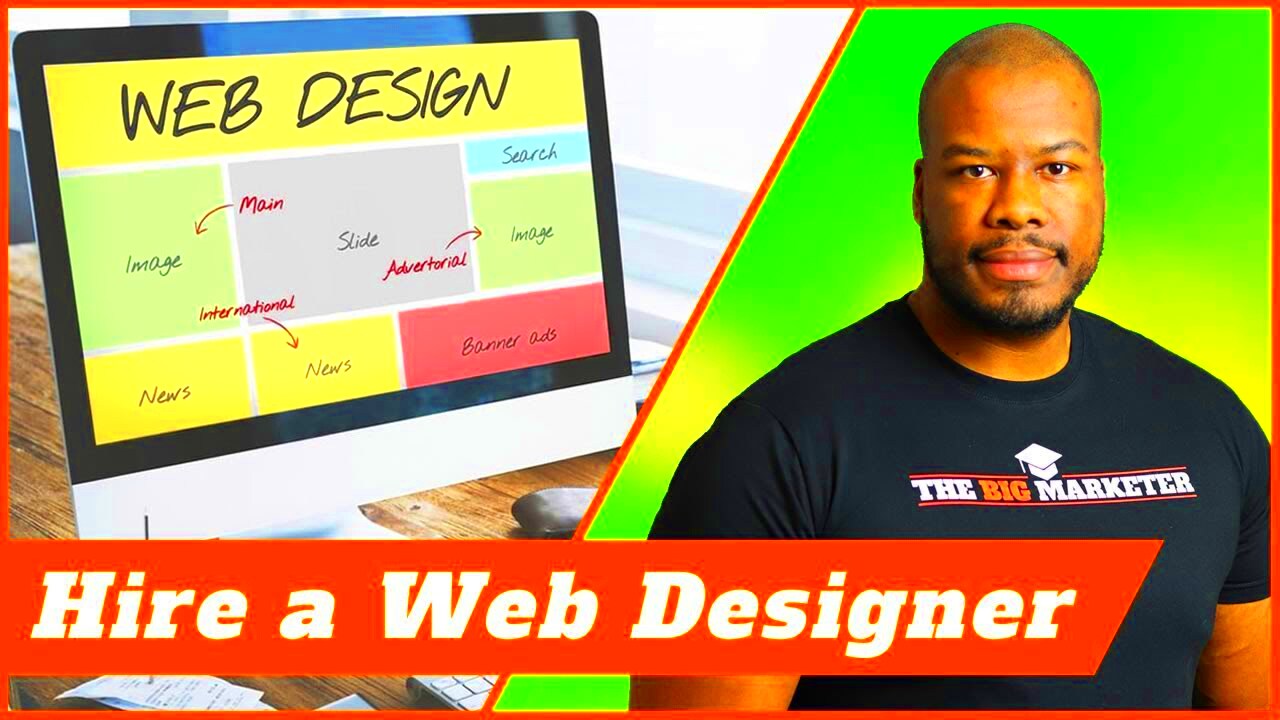When it comes to launching or revamping your small business, having a standout website is crucial. It isn’t just a digital storefront; it’s often the first impression potential customers will have of your brand. Hiring the right website designer can make all the difference in translating your business vision into a functional and appealing online presence. In this post, we’ll explore why hiring a professional website designer is essential and how to ensure your site meets your unique business requirements.
Understanding Your Small Business Website Needs

Before diving into the process of hiring a website designer, it’s vital to have a clear grasp of your small business’s specific website needs. Let’s break this down into manageable parts:
- Defining Purpose: Ask yourself what you want your website to accomplish. Is it to provide information, generate leads, or sell products? Identifying the primary goal is critical.
- Target Audience: Who are you trying to reach? Understanding your audience will help guide the design and functionality to cater to their preferences.
- Required Features: Consider which features are essential for your website. Common necessities include:
- Design Preferences: Think about the visual style you want for your website. Consider color schemes, font choices, and overall aesthetics that align with your brand.
- Budget Constraints: Establish a budget for your website design project. This will help narrow down your options and set realistic expectations.
| Feature | Purpose |
|---|---|
| Contact Forms | Facilitate communication with potential customers. |
| E-commerce Capabilities | Allow for online purchases if you’re selling products. |
| Blog Section | Share industry insights and improve SEO. |
| Portfolio Gallery | Showcase your work if you provide services. |
By thoroughly understanding your small business website needs, you’ll be well-equipped to engage with potential designers and ensure they deliver a site that aligns with your goals and vision.
Key Qualities to Look for in Website Designers
When it comes to hiring a website designer for your small business, certain qualities can make all the difference. You want someone who not only understands aesthetics but also has a solid grasp on functionality and user experience. Here are some key qualities to keep an eye out for:
- Creativity: A good designer thinks outside the box. They should be able to create visually appealing designs that stand out from the competition.
- Technical Skills: Proficiency in software like Adobe Creative Suite, HTML, CSS, and maybe even JavaScript is essential. This ensures they can bring their creative ideas to life.
- Responsive Design Knowledge: With users accessing websites from various devices, a designer must be adept at creating responsive designs that look great on desktops, tablets, and smartphones.
- Understanding of User Experience (UX): Your designer should prioritize UX principles, ensuring that visitors to your site find it intuitive and easy to navigate.
- Strong Portfolio: A diverse and comprehensive portfolio is a must. This demonstrates their range of styles and projects they have worked on in the past.
- Communication Skills: Good communication is crucial. Your designer should be able to discuss ideas, gather feedback, and explain design choices effectively.
- Ability to Meet Deadlines: Timeliness is key. Look for someone who understands the importance of deadlines and can deliver quality work on time.
By focusing on these key qualities, you can ensure that you hire a website designer who will meet your small business’s unique needs and help you establish a strong online presence.
Types of Website Design Services Available
When searching for website design services, you’ll discover a plethora of options tailored to different business needs and budgets. Understanding the various types of services can help you make informed decisions about what’s best for your small business. Let’s break down some of the primary types:
| Type of Service | Description | Best For |
|---|---|---|
| Custom Website Design | Tailor-made designs that cater to your specific brand identity and functionality needs. | Businesses looking for a unique online presence. |
| Template-Based Design | Using pre-designed templates that are customizable to a certain extent. | Startups and businesses on a tight budget. |
| E-commerce Design | Websites focused on selling products online, complete with shopping carts and payment gateways. | Retailers and businesses looking to sell online. |
| Responsive Design | Designs that automatically adjust and look great on any device—desktop, tablet, or mobile. | All businesses aiming to accommodate mobile users. |
| SEO-Focused Design | Websites designed with search engine optimization in mind from the ground up. | Businesses wanting to improve online visibility and traffic. |
By understanding the different types of website design services available, you can better identify which option fits your small business needs, ensuring that you not only have a beautiful website but also an effective one.
Where to Find Website Designers for Small Businesses
Finding the right website designer for your small business can feel like a daunting task, but there are numerous avenues you can explore to ensure you find someone who is a perfect fit. Let’s dive into some effective places to search for talented website designers:
- Freelance Platforms: Websites like Upwork, Fiverr, and Freelancer are gold mines for finding website designers at various budget levels. You can browse profiles, read reviews, and even see past work before making a choice.
- Design Agencies: For a more comprehensive service, consider collaborating with a design agency. These teams often have a wider range of expertise and can handle everything from web design to marketing.
- Local Networking Events: Attending small business events, meetups, or tech conferences in your area can lead you to qualified designers. Plus, you get the added benefit of meeting face-to-face and establishing a rapport.
- Social Media: Platforms like LinkedIn, Instagram, and Facebook are great for connecting with freelance designers. Many showcase their portfolios and client testimonials, giving you a sense of their style and expertise.
- Referrals: Don’t underestimate the power of word-of-mouth! Ask fellow business owners for recommendations. A personal referral can lead you to trustworthy professionals.
By exploring these options, you should be well on your way to finding a website designer tailored to your small business needs.
Evaluating Portfolios and Previous Work
Once you’ve gathered a list of potential website designers, the next crucial step is evaluating their portfolios and previous work. This will give you insight into their style, capabilities, and whether they align with your vision. Here’s how you can effectively assess their portfolios:
- Look for Variety: A good designer should showcase a range of styles. This diversity demonstrates their ability to adapt to different brands and needs. Examine whether they have worked on projects within your industry.
- Quality Over Quantity: It’s tempting to glance through a plethora of projects, but focus on the quality of the work. Look for designers who prioritize functionality and user experience.
- User-Friendly Design: Assess how easy it is to navigate their portfolio. If it’s challenging to navigate, that could be a warning sign about their design skills.
- Responsive Design: With more users accessing websites via mobile devices, ensure the designer has experience with responsive design. Examine how their past projects look on different devices.
- Client Feedback: Check for testimonials or case studies that reflect clients’ experiences. Positive feedback can give you confidence in their abilities.
By carefully evaluating these aspects of a designer’s portfolio, you can make a more informed decision when hiring the right professional for your small business website.
7. Setting a Budget for Website Design
When it comes to hiring a website designer for your small business, one of the first and most crucial steps is setting a budget. The beauty of website design is that there’s a wide range of pricing options available, but this can also make it a bit overwhelming. To help you out, let’s break down why you should set a budget and how to go about it.
Why Setting a Budget Matters: A clear budget helps you focus on options that are realistic for your finances, allowing you to align your website design with your business goals. It can also prevent you from falling into the trap of overspending or skimping on important features.
Factors to Consider: Your budget might depend on several factors, including:
- Complexity of the Website: Will you need a simple landing page, or a complex e-commerce site?
- Design Quality: Do you want a custom design, or would a template suffice?
- Functionality: Will you need special features or functionalities such as a blog, booking system, or membership area?
- Ongoing Costs: Don’t forget to consider the costs associated with maintenance, hosting, and updates.
It’s essential to do a little bit of research to understand what a reasonable budget might look like for your type of business and website design. Small business website designs can range from $500 to over $10,000. Once you’ve established a clear budget, communicate it to potential designers to ensure you’re on the same page from the start.
8. Questions to Ask Potential Website Designers
So, you’ve narrowed down your list of potential website designers for your small business. Great! But before you sign anything, it’s essential to ask a few key questions to ensure you choose the right fit. Let’s explore some important inquiries you should consider making.
Key Questions to Ask:
- What is your design process like? Understanding their workflow can help you gauge how involved you’ll need to be and what to expect at each stage.
- Can you provide examples of your previous work? Portfolio showcases are a fantastic way to assess their style and capabilities.
- How will you ensure the website is mobile-friendly? In today’s mobile-driven world, this is non-negotiable.
- What kind of post-launch support do you offer? It’s essential to know what happens after your site is live. Will they assist with maintenance or updates?
- What platforms do you specialize in? Make sure the designer is familiar with the platform that fits your business needs best.
- How do you handle SEO basics? Ask about their approach to ensuring your site is search-engine friendly from the get-go.
- What is the estimated timeline for project completion? Get a clear idea of when you can expect your site to launch.
- Can we discuss the pricing breakdown? Understanding where your money is going can alleviate future misunderstandings.
These questions will not only help you gauge the designer’s fit for your project but also build a solid foundation for a smooth collaboration. Remember, the right designer will listen to your needs and actively engage in your vision. Happy hiring!
Working with Website Designers: What to Expect
When you decide to hire a website designer for your small business, you’re probably feeling a mix of excitement and apprehension. It’s natural; after all, you want your website to reflect your brand and drive results. So, what can you expect during this journey?
Firstly, expect a lot of communication. A good designer will want to understand your business goals, target audience, and brand identity. This initial phase usually includes a detailed questionnaire or a kickoff meeting. You’ll discuss:
- Your business objectives
- The intended purpose of the website
- Color schemes and overall aesthetics
- Competitor analysis
Next up is the proposal stage. Here, the designer will present their ideas, including website layout and features, usually through wireframes or visual mockups. It’s vital to really dive into this phase; provide feedback, ask questions, and ensure the design aligns with your vision.
After mutual agreement, the design process kicks into high gear. Expect regular updates and possibly a project management tool to facilitate smooth communication. You might even be asked to review specific elements, like typography or images as they come together.
Lastly, once the site is designed, a testing phase will occur. This is where you’ll check for any glitches and ensure everything runs smoothly before launch. Remember, the designer’s goal is not only a visually appealing site but one that functions perfectly for user experience.
Best Practices for Collaborating with Your Designer
Collaborating effectively with your website designer can make a significant difference in the final outcome of your project. Here are some best practices that can smooth the process and ensure successful results.
1. Be Clear About Your Vision: It’s crucial to articulate your ideas, preferences, and expectations clearly. Use visual aids like inspiration boards or examples of websites you admire to communicate what you envision.
2. Establish Open Lines of Communication: Regularly check in with your designer through emails, calls, or project management tools. Don’t hesitate to share your thoughts or concerns as they arise; it’s easier to adjust things early rather than late in the process.
3. Set Realistic Deadlines: Designing a website is a process that takes time. Collaborate on a timeline that feels manageable for both parties. Remember to factor in time for feedback and revisions.
4. Trust Their Expertise: You hired your designer for a reason; trust their insight and professional knowledge. While your input is invaluable, be open to their suggestions that could enhance your site’s functionality and aesthetic.
5. Keep the User in Mind: Always think about the end user and their experience on your website. Share any insights you have about your target audience, so the designer can create a user-friendly layout that engages visitors.
By following these best practices, you’ll foster a collaborative relationship with your designer, making the journey more enjoyable and ultimately leading to an impressive website that meets your small business needs.
Final Thoughts on Hiring Website Designers
When it comes to establishing an online presence for your small business, hiring professional website designers is a crucial step. A well-crafted website not only showcases your brand but also serves as a vital tool for customer engagement and lead generation. Here are some key considerations to keep in mind:
- Understand Your Needs: Before starting your search, outline your specific requirements. Do you need an e-commerce site, a portfolio, or a blog? Having a clear vision helps attract the right talent.
- Check Portfolios: Review the portfolios of potential website designers to get a sense of their design style and previous work experience. Look for projects similar to what you envision.
- Assess Technical Skills: Ensure the designer possesses the technical skills required for your website, such as proficiency in HTML, CSS, and popular content management systems (CMS).
Additionally, it’s wise to consider the following factors:
| Factor | Importance |
|---|---|
| Budget | Define how much you are willing to invest in design services. |
| Timeline | Set a realistic timeline for the project’s completion. |
| Communication | Clear communication with your designer is crucial for successful collaboration. |
Ultimately, the right website designer can transform your business’s digital footprint, making it engaging and user-friendly. Invest the time to choose wisely, as this decision can lead to long-lasting benefits for your business’s success.



